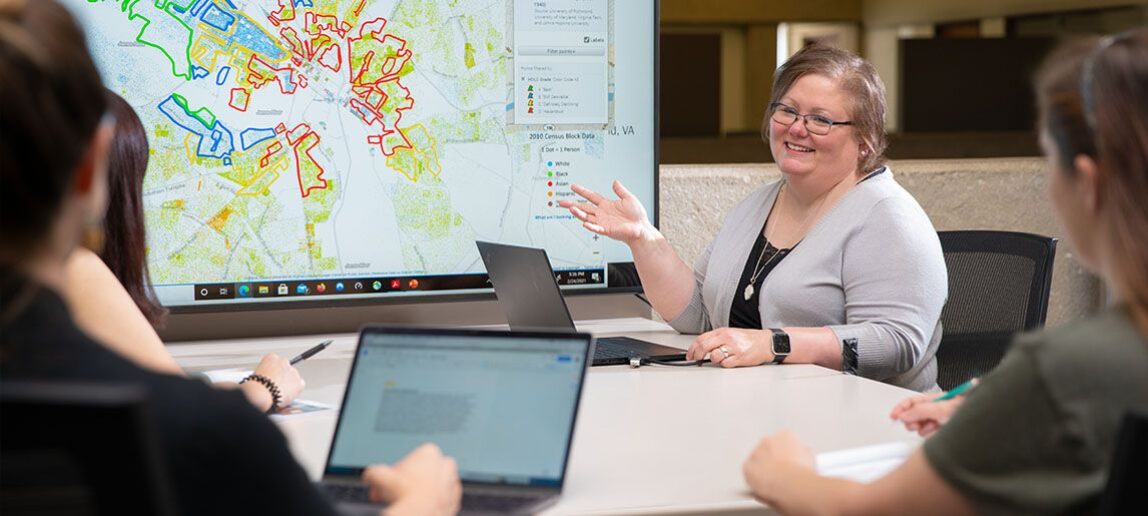Mentoring the next generation of urban planners
As an urban planner, Shannon Van Zandt, professor and executive associate dean at the Texas A&M College of Architecture, knows that where one lives has a major impact on an individual’s well-being.
“My career began with an interest in affordable housing and low-income home ownership,” said Van Zandt. “But now I also focus on the dramatic effect that the location of one’s home can have on an individual or family’s health, safety and prosperity.”
As such, her focus includes identifying forces that restrict access to high-quality neighborhoods and the consequences of such restrictions, including poor access to community amenities and greater exposure to natural disasters like urban flooding.
A renowned researcher, Van Zandt has published on affordable housing, neighborhoods’ natural disaster- related vulnerability and resiliency, housing recovery and more. Her projects have been funded by the National Science Foundation, the U.S. Department of Housing and Urban Development, and the National Institute for Standards & Technology, to name a few.
In addition to supporting informed, housing-related policymaking and outreach efforts, her work shapes the next generation of urban planners through teaching and mentoring current and former students.
“I met Van Zandt at graduate student orientation,” said Marccus Hendricks ‘13, an assistant professor of urban planning at the University of Maryland. “She was very intentional in making me feel welcome, showing a genuine interest in me as an individual and professional, and she has been my mentor ever since.”
Van Zandt served as Hendricks’ major professor and dissertation committee chair while he was at Texas A&M, and they now work as co-investigators on research projects, co-authors on publications and co-panelists at professional meetings.
“Her work set the stage for my dissertation and current research program,” said Hendricks. “She guided me through my graduate studies, the academic job search, the tenure-track process and most importantly she has been a friend, encouraging me to stand up for what I believe in, whether she agrees or not.”
Van Zandt credits Walter Gillis Peacock and Forster Ndubisi, Texas A&M urban planning professors, as examples of the type of teacher and mentor she wanted to become.
“They challenged me to focus on my research while keeping the big picture in mind, and were very generous with their time, expertise and encouragement,” said Van Zandt. “Walt helped me realize that disaster research was something I needed to be involved in, and Forster inspired my development as an administrator.”

Hendricks credits Van Zandt for having a similar impact on his career.
“She is an intellectual leader in the fields of housing, social vulnerability, community development, disaster recovery and hazards,” said Hendricks. “Her work has been transformative in the lives of students, colleagues and in our profession. As a role model and trusted advisor, I couldn’t overstate the impact she has made on my life and career.”
Van Zandt’s big picture view of her role led to mentoring a former student who heads the REACH Project, a nonprofit organization that helps contract employees who work on the Texas A&M campus. Contract employees generally receive low wages and have unmet needs related to health care, food security, affordable housing, money management and education. Referred to as essential Aggies, these workers include food service, custodial, maintenance and security guards who maintain the educational, research and daily living spaces of students, faculty and staff.
“I wanted to develop affordable, quality housing options for essential Aggies,” said Max Gerall ‘18, a communications graduate and co- founding CEO of the REACH Project. “Van Zandt’s name kept coming up as an expert with a passion for affordable housing, so I went to her office unannounced and waited until she could meet with me,” said Gerall.
Gerall shared his vision for the REACH Project and his notable accomplishments up to that point, and Van Zandt became his mentor, friend, a champion for the cause — and later became a member of the project team.
“She challenged me to think broadly, to learn more about our community, and pointed me to resources that could help,” said Gerall. “We looked at research to discover what has worked and what hasn’t in developing affordable housing, and she introduced me to individuals and organizations whose missions could support our efforts.”
Van Zandt accepted a volunteer position as president of the REACH 12 Advisory Board, and she also heads the group’s housing consortium, which aims to create affordable housing for clients.

“Essential Aggies are so important to the success of the university, and many are second-generation employees who support our institution,” she said. “My involvement gives me an opportunity to support individuals and families that make Aggieland better, and it aligns with my personal and professional interests,” said Van Zandt, who has helped open doors for the organization and facilitated collaborative relationships.
“We are exploring the possibility of working with the university to build what we’re calling a learning village that would offer affordable housing for our clients, and educational and research opportunities for students,” said Gerall. “She has served as a resource and mentor, and has helped me to develop as a leader.” Van Zandt has also had a hand in shaping the processes by which the organization operates.
“She is extremely thorough in everything she does,” said Gerall. “I get really excited and sometimes want to just push through, but she makes sure we’ve done our due diligence by researching options, making a strategic plan and creating a foundation for success. She’s really helped to position the REACH Project well.”
Van Zandt is poised to make a tremendous impact on in her areas of expertise through her interaction with students and peers as a teacher, researcher, and mentor. Gerall and Hendricks are two examples in a long line of inspired and thankful colleagues.
“She is a compassionate, yet fearless leader and finds a great balance between being personable and facilitating productivity,” said Hendricks. “I can’t imagine how I would have navigated graduate school and my path to being a tenured professor without her input. Mentors matter, and she is one of the best!”


